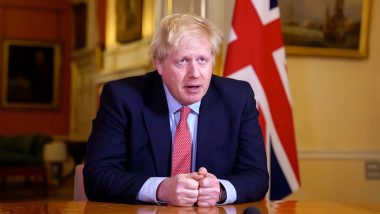London, May 15: British Prime Minister Boris Johnson is set to declare a so-called war on fat as studies indicate greater risk from COVID-19 due to obesity and related illnesses, according to UK media reports. According to recent research from Glasgow University, being obese doubles the risk of needing hospital treatment for the novel coronavirus and the link between obesity and other health problems such as heart disease and diabetes also increases the risk levels from the deadly virus.
According to ‘The Times', Johnson has told senior ministers and advisers that he has changed his mind on not having a state interventionist approach to fighting obesity and is said to be drawing up a revised strategy. British PM Boris Johnson Hopes COVID-19 Vaccine Will Be Developed, But Says 'No Guarantee'.
The 55-year-old, who has admitted to have struggled with keeping his weight under check, was hospitalised with COVID-19 last month. Some experts have indicated weight as a factor behind the seriousness of his symptoms compared to some of his thinner Cabinet colleagues who bounced back quicker despite testing positive for coronavirus, such as Health Secretary Matt Hancock.
According to official statistics, about one in three British adults is clinically obese, classified as those with a body mass index (BMI) above 30, one of the highest rates in the Western world. BMI is determined by a person's weight relative to their height.
Encouraging more cycling and walking is part of the UK government's wider plans in the war on obesity. Campaign group Action on Salt and Action on Sugar have also written to Johnson, calling for a ban on junk food advertisements during the coronavirus lockdown to encourage healthy lifestyles.
“Obesity and type 2 diabetes are widely regarded as two of the nation's most pressing public health issues, yet the promotion of unhealthy food, although acknowledged as an important issue by the government, continues unabated, with little or no regard to the damaging effect this is having on people's long-term health,” the letter notes.
The UK has already introduced a so-called sugar tax on sugary soft drinks to cut the consumption of added sugar in the diet. The Soft Drinks Industry Levy, in force since 2018, is based on the levels of sugar in the drinks, with the most sugary drinks paying the highest tax. There are indications that further such moves may be in the offing if proved effective in the fight against obesity.













 Quickly
Quickly





















